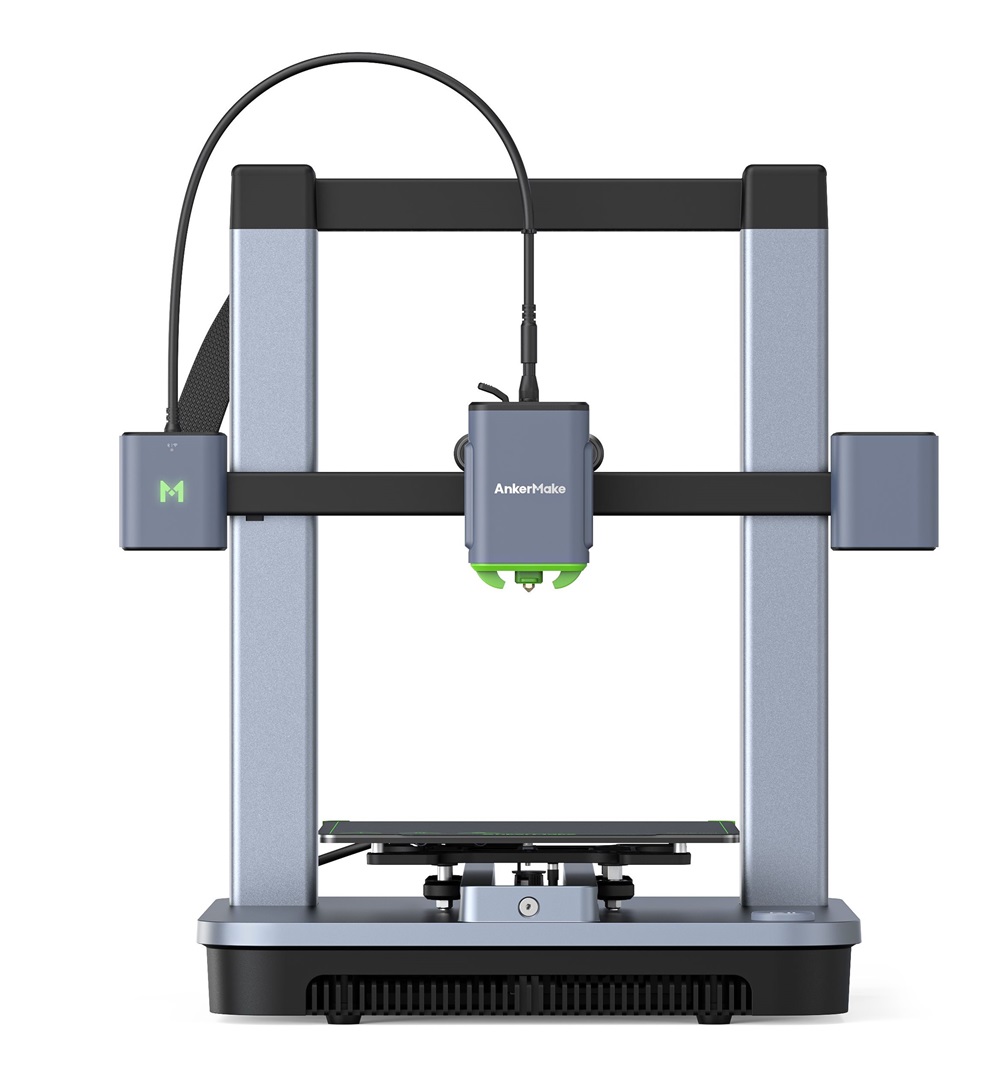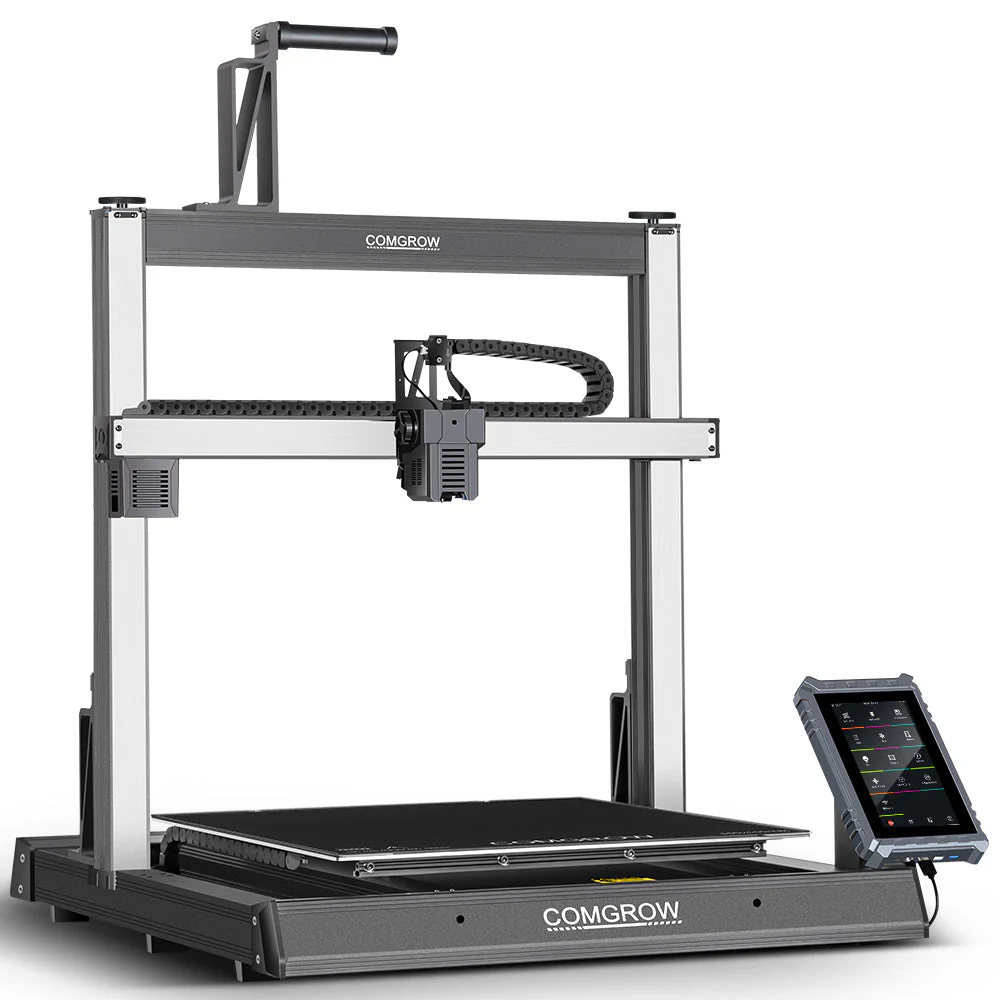Compare M5C vs Comgrow T500
Comparison between the best 3D printers
Choose the best 3D printer at the best price. The cheapest 3D printers are here.
Buy a 3D printer here with 3D Fila.
 |
 |
|
| Model | M5C[BUY M5C] |
Comgrow T500 |
| Printing Material | Filament | Filament |
| Buy Filament for AnkerMake M5C | Buy Filament forSovol Comgrow T500 | |
| Estimated price | $399,00 | $799,00 |
| Manufacturer | AnkerMake | Sovol |
| Release Year | 2023 | 2024 |
| Print Volume [mm] | 220x220x250 | 500x500x500 |
| Printer Size [mm] | 466x374x480 | 817x810x962 |
| Weight [kg] | 9,6 | 39 |
| Power Loss Recovery | YES | YES |
| Enclosed printer | NO | NO |
| Bed Leveling | Automatic | Automatic |
| Filament End Sensor | YES | YES |
| Bed type | Heated | Heated |
| Power supply system | Direct Drive | Direct Drive |
| Standard nozzle | 0,4 | 0,4 |
| Maximum Nozzle Temperature [°C] | 300 | 300 |
| Maximum Bed Temperature [°C] | 100 | 80 |
| Maximum printing speed [mm/s] | 500 | 500 |
| Filament holder | YES | YES |
| Camera for supervision | NO | NO |
| Recommended filaments | PLA, PETG, TPU, ABS, PA, PLA-CF, PETG-CF, PA-CF | PLA, PETG, Fibra de Carbono, TPU |
| Recommended slicers | AnkerMake Studio (macOS, Windows), Simplify3D, Ultimaker Cura, PrusaSlicer | Creality Print, Cura 5.0 ou superior, Prusa Slicer, Orca |
| Maximum Resolution [mm] | 0,1 | 0,1 |
| Processor | ||
| Display | 7'' IPS touchscreen, 60Hz | |
| Power Supply | 350 W | 500 W |
| Connectivity | Wi-Fi, USB-C, Bluetooth | |
| Operating systems | Windows, Linux e Macbook | |
| Date of registration in the system | 2024-09-11 | 2024-07-18 |
| Release date | 2023 | 2024 |
| Extra features | The AnkerMake M5 printer stands out for its impressive print speed, reaching up to 500mm/s. It features AI print monitoring, an integrated camera for creating timelapses, auto-leveling bed with pressure sensor, direct extruder, flexible PEI-coated build plate, and Wi-Fi and USB-C connectivity. Assembly is quick and easy, and the printer is designed to deliver high print quality and ease of use. | The Sovol Comgrow T500 stands out for its large print volume of 500x500x500 mm, ideal for large-scale projects. It has a direct extruder with a gear ratio of 6.5:1, speeds of up to 200 mm/s, and high-performance motors. The 7" touchscreen with Klipper software makes navigation easy. The 49-point automatic leveling ensures a perfect first layer. It also has a full metal hotend at 300°C, linear rails on all axes, and WiFi connectivity. |
| Support for multiple colors and materials (AMS and CFS) | NO | NO |
Notes * |
||
| Cost-benefit | 7 / 10 | 7 / 10 |
| Hardware | 2.8 / 10 | 3.2 / 10 |
| Tela | . | . |
| Print volume | 3 / 10 | 5 / 10 |
| Performance | 4 / 10 | 4 / 10 |
| [BUY M5C] |
Conclusion |
| In comparing the AnkerMake M5C and the Sovol Comgrow T500, both 3D printers present distinct strengths catering to different user needs. The AnkerMake M5C is a budget-friendly option that excels in speed, achieving a maximum printing speed of 500 mm/s, making it a suitable choice for users who prioritize quick production times and ease of use. Its compact build size and lightweight design enhance its portability, and features like automatic bed leveling, a heated bed, and a variety of compatible filaments make it accessible for beginners and hobbyists. Its robust connectivity options, including Wi-Fi, USB-C, and Bluetooth, add convenience, while the large touchscreen facilitates user interaction. On the other hand, the Sovol Comgrow T500 offers a substantial increase in print volume, ideal for larger projects or batch printing, which may appeal to more advanced users or businesses seeking to produce larger models. It boasts a solid design with high-quality components, including a full metal hotend and linear rails on all axes, which contribute to its stability and print quality. The advanced automatic leveling system and 7" touchscreen with Klipper software enhance usability for seasoned 3D printing enthusiasts. Ultimately, the choice between these two printers hinges on individual priorities. The M5C is an excellent choice for those seeking speed and efficiency at an affordable price, while the T500 caters to users who require larger print capabilities and a robust build quality. Both printers demonstrate good value for money within their respective price segments, appealing to different segments of the 3D printing market. |

